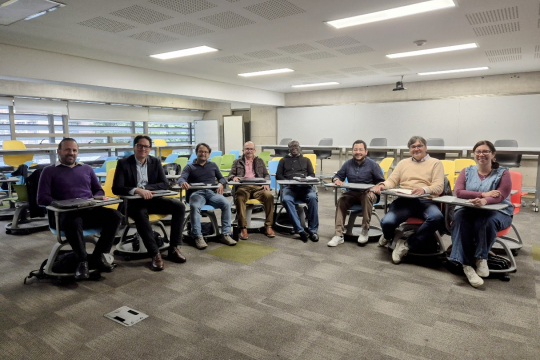Food waste, electronic waste, and the impact of fast fashion were some of the urgent topics addressed in a workshop by the SCOPE Collaborative Program (Sustainable Consumption and Production). This workshop emphasized that international cooperation is crucial to achieve sustainable consumption and production goals, particularly in low- and middle-income countries (LMICs), with a special focus on Sub-Saharan Africa.
Researchers from EfD Central America and Mexico participated in a two-day SCOPE workshop on March 18-19 at the University of the Andes in Bogotá, Colombia. The event was part of the First Congress of the Latin American Association of Environmental and Natural Resource Economists (LAERE), fostering dialogue and knowledge exchange among international researchers.
A platform for debate and international collaboration
The workshop brought together EfD researchers from Chile, Colombia, Costa Rica, Mexico, Ghana, Nigeria, Kenya, and the Global Hub. Discussions focused on identifying knowledge gaps, refining methodological approaches, and developing strategies to address pressing issues in sustainable consumption.
Interactive sessions facilitated knowledge-sharing and strengthened research synergies. “These events are crucial for enhancing cooperation among researchers and developing evidence-based sustainable consumption and production solutions for different regional contexts,” said Pablo Evia, EfD-CAM researcher and SCOPE coordinator.
Comparative research across regions provides valuable insights
One of the workshop’s highlights was the discussion on using harmonized experiments—standardized studies conducted simultaneously across different regions—to enable meaningful comparisons and generate insights that support solutions for sustainable consumption and production.
Francisco Alpízar, Chair and Professor at Wageningen University and SCOPE’s Scientific Leader, delivered a presentation on the potential of these harmonized experiments in generating impactful evidence.
“Harmonized experiments offer a powerful approach to investigating waste management in Global South countries. By coordinating multi-team efforts under a unified Theory of Change, we can ensure replicability and cross-country learning. As seen in natural resource governance studies, such strategies enable rigorous, policy-relevant insights at a global scale,” said Alpízar.
SCOPE is addressing increasingly important issues
The SCOPE Collaborative Program plays a key role in addressing sustainable consumption and production challenges, particularly in the Global South. SCOPE’s efforts align with Sustainable Development Goal (SDG) 12. By fostering international partnerships and advancing applied research, the program contributes to the development of actionable, science-based solutions that support policy decisions and drive meaningful change. As sustainability issues become more urgent, the program plays an important role in shaping a more sustainable future in the Global South.
More information about the LAERE Congress can be found at: https://www.efdinitiative.org/news/exploring-public-support-sustainable-consumption-laere-congress
By: Daniela Rivera
